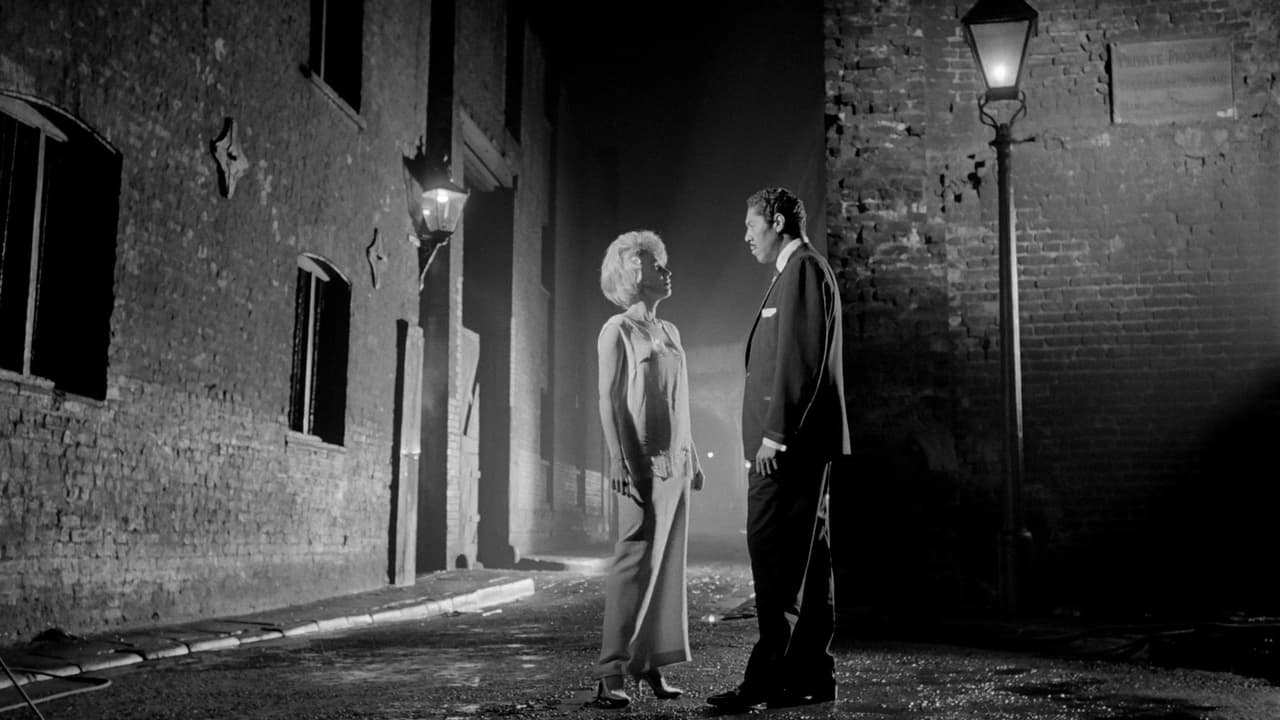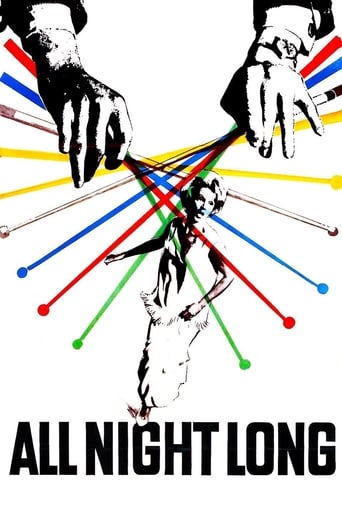

The film, based on Othello, is neatly positioned as a vehicle to showcase some of the best Jazz musicians of the period -- including Dave Brubeck and Charlie Mingus.What is most interesting about this film is how it handles racial relations. That was an important part of "Othello", but really defined the 1960s. I love how 1963 was the year of the "I Have a Dream" speech, but already in England films like this had blacks and whites mingling without any sort of trouble. How much more mature they were...The film was released by The Criterion Collection in January 2011, and it deserved to be. Criterion has done a great job of finding lost classics and cleaning them up -- the beautiful black and white cinematography deserves to be seen, and the jazz soundtrack deserves to be heard.
... View MoreI kind of looked forward to this -- Patrick McGoohan, Charlie Mingus, Dave Brubeck, Billy Shakespeare. How could it go wrong?But it's pretty slow and ultimately unbelievable. When I see a band manager being taunted by a drummer, McGoohan, and becoming enraged while stoned, instead of flinging himself on the couch with three bags of Doritos, there's something wrong. With dialog like, "Do you agree with Margolis that jazz is nothing more than regressive narcissism?", I shiver all over. I couldn't even get hep to the music. It's noisy and represents the most banal form of West Coast jazz. And while the saxophonist could keep up, the trumpeter had no idea of what the hell Dave Brubeck was up to at the piano with his fancy 5/4 time.Brubeck can't act either, though he's not pressed too hard in that regard -- one or two lines. McGoohan CAN act but he's playing a fast-talking hustler and con man here and that's not his strong suit -- not his FORTE, so to speak. He's best at slow, sly, deliberate lines delivered in a clipped voice with odd hesitations as if there are all kinds of wheels turning behind that utterance. Richard Attenborough can act too, but he doesn't put much effort into his role here. There is, after all, nothing to put much effort into.One notable property of this film. If it had been made in the USA, it would have been all about the happy marriage of a black man and a white woman. Racial epithets would have been hurled around. Charlie Mingus, author of "Beneath the Underdog," would have torn off his clothes on the bandstand and run around naked, shouting, "Oogoo Boogoo MAU MAU." But in this British movie, nothing is made of the mixed marriage. Nothing is made of race at all. Refreshing in a 1962 movie. It's not bad, in the sense that it's not insulting. It doesn't treat the audience as a horde of unkempt morons. It's just that it's so much less than engrossing.
... View MoreCharlie Mingus pretended to hate everybody who wasn't black.. He must have had a field day pretending to hate nearly everybody in this appallingly corny retread of "Othello".Actually I believe he truly did hate Dave Brubeck:their scene together must have been the stuff of nightmares both for the director and for Mr Brubeck who looks throughout as if something very unpleasant has been placed on his piano stool. Richard Attenborough breezes through the movie as if he is on the way to somewhere more important.Patrick Mc goohan utterly fails to convince both as a jazz drummer and as a cut-price Iago,and if he leaves this one out of his CV I wouldn't blame him a bit. I suspect the makers,obviously keen to cash in on what they saw as the popularity of jazz failed to make the distinction between what was then referred to as "modern Jazz" and the sort of jolly English bastardisation of New Orleans music that was nibbbling away at the bottom of the charts at the time. Perhaps they should have cast it with Acker Bilk instead of Dave Brubeck.Charlie Mingus would have loved that. The only excuse for watching "All night long" now is that it gives you a chance to see really cool guys like Tubby Hayes in Italian suits looking absolutely the DB. A picture printed at the time in the "Melody Maker" showed Mr Mingus dressed up like a city gent,with a natty bowler and an umbrella. No wonder he hated Whitey.
... View MoreThis is an interesting period piece, especially for jazz lovers and those who remember the early sixties. The plot is fairly silly, but entertaining enough to hold the attention. It tells the story of jealousy and scheming amongst a number of jazz musicians at a party held in a London warehouse.The acting is fairly good, but what makes it especially interesting is the fact that the action takes place against the back drop of a continuous jam session featuring solos by musicians such as Dave Brubeck and Tubby Hayes.
... View More